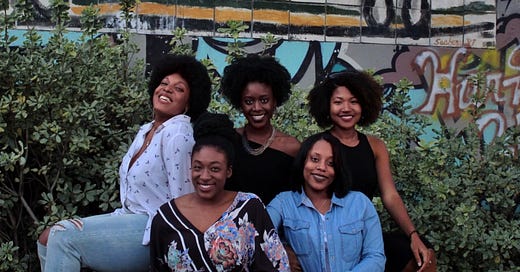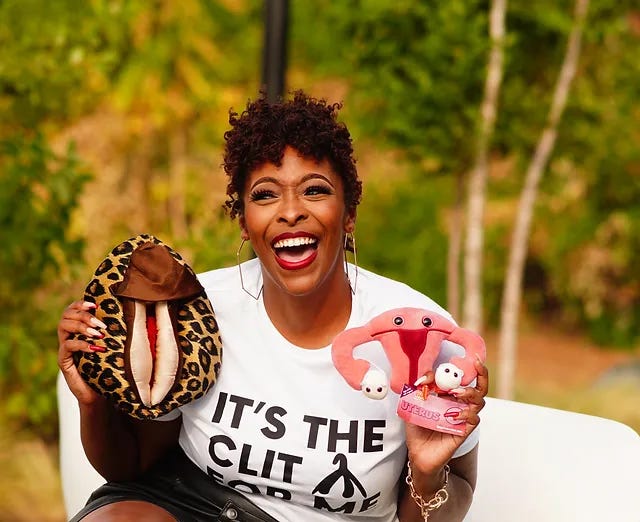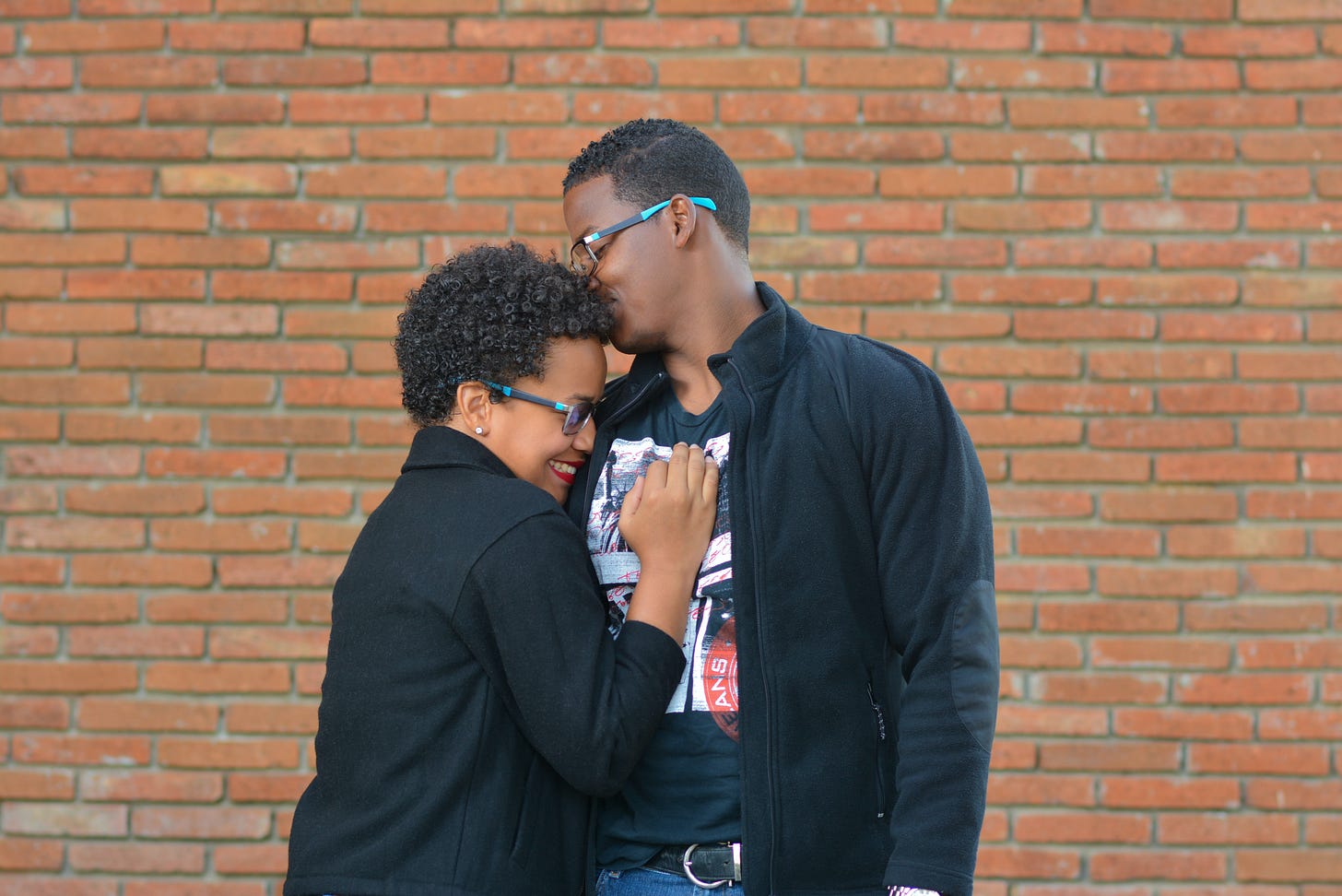"What femininity looks like in purity culture is not always afforded to Black women."
A Surviving Purity Culture Interview with Brittany Broaddus-Smith
Welcome to Surviving Purity Culture, a mini-series of interviews with purity culture survivors and diverse experts. These are the full-length transcripts of the interviews I conducted for my book, Recovering from Purity Culture. This post is free to all today to give you a sample of what is to come for paid subscribers or members of my launch team.
Welcome to the Surviving Purity Culture Interviews1. Here is a line-up of this Mini-Series. Today’s interview features Brittany Broaddus-Smith.
Experts:
Brittany Broaddus-Smith, a Christian sexologist: Purity Culture's Effects on Black Women
Bridget Eileen Rivera, an activist and author: Purity Culture’s Effects on Queer Christians
Sarah McDugal, an advocate and coach: How to Recognize Unhealthy or Abusive Relationships
Survivors’ Stories:
“Carrie”: prolonged singleness
“Nicole”: divorce and marital rape
Emily: dating and reconstructing your sexual ethic after the death of your spouse
“Elizabeth”: dating and your sexual ethic after divorce
Alisha: abusive marriage and remarriage after divorce
Hanna: vaginismus in marriage
I got connected to Brittany after appearing on The Love Hour podcast with Melissa and Kevin Fredericks, which Brittany had also appeared on. Brittany is a licensed clinical social worker, a Christian sexologist, a mom, and a Black woman. I knew I wanted to understand more about the dynamics of racism and purity culture, a topic I have only briefly explored in an IG Live interview. I live in a largely racially homogenous area of the U.S. and my practice serves predominantly white clients, so I needed someone who could speak to the unique harm purity culture causes to Black women. While Black people are not a monolith and Brittany cannot speak on every Black woman’s experience, I am still grateful for the valuable insight and eye-opening perspectives she shared with me.
Faith and Church
Brittany shared, “I got saved at age 14 when I started attending church. My mom was dating a deacon. They broke up but my mom and I kept going!”
“The Black Pentecostal experience is different than the Black evangelical experience. Evangelicalism is predominantly white. [In Evangelical churches, the question becomes,] what do I need to do to fit into this space and to find welcoming worship spaces around people who don’t look like me or have my lived experience?”
Experience of Purity Culture
Brittany is now divorced, but on her wedding night, she still felt like sex was a sin. She repented of this “sin” on her wedding night.
“In purity culture, the main word is purity,” she explained. “For Black people, it is holiness. But it becomes all about sexual behavior. There is a belief that you would be a better candidate for a wife and worth waiting for if you dressed a certain way and acted a certain way.” [Camden’s note: This sounds like the Spiritual Barometer Myth, which says you are a better Christian if you are pure, and your purpose as a woman is to stay pure.]
The concept of soul ties has always fascinated me. Brittany informed me that “soul ties” are heavily emphasized in the Black church. According to Brittany, a belief in soul ties is often traced to 1 Corinthians 6:16 and 1 Samuel 18:1.
Sex Education
“There is often silence when it comes to sexual education,” she explained. “‘You’re not supposed to do this so there's no reason for me to prepare you for what you’re not supposed to do!’ Then, when you get married, your husband will teach you.” [Camden’s note: This sounds like the Flipped Switch Myth, which says once you get married you will have amazing sex, and the Gatekeepers Myth, which says sex is for men.]
Brittany is passionate about educating others about sex. “I want women to know you don’t have to sin to be informed. You can have sexual awareness and wellness. As Black women, we are not socialized to speak up for what we want. Black women have to fight just to be heard. Like in the medical field, our pain isn’t real, we aren’t listened to, so we won't speak up about pleasure in the bedroom either. But you can make the radical decision to speak up for your pleasure.”
Brittany’s work focuses on how you can be a woman of God and a sexual being. She particularly makes space for Christian women who are single and dating and want to uphold an ethic of abstinence.
“The heaviest shame we have to shake is when we feel like we have no other choice but to change our beliefs because we are getting older, missing out, losing hope that we’ll find someone, or the stigma of being single. There is no condemnation in Christ2. We want to remove the condemnation. But we don’t want to remove the conviction.” [Camden’s note: Brittany’s distinction between condemnation and conviction is similar to the distinction I make between shame versus healthy, justified guilt in my book.]
Racial and Religious Trauma
Brittany explained that Black women suffer from the weight of the religious trauma of purity culture, plus the weight of systemic racism. Anything that affects white women, it likely affects black women even more due to intersectional feminism3.
“What femininity looks like in purity culture is not always afforded to Black women,” she explained. “Chastity, inherent purity, innocence—those are not qualities associated with Black bodies.”
Black females are sexualized at an early age.4 “If you’re a little girl who hits puberty early or has a shapely body, there is a presumption that you are ‘fast’,” Brittany explained. “You don’t want to be accused or presumed of sinning, because this brings shame to your family, your church, and your community. If you’re from a family of faith leaders, it’s even more complicated and shameful.”
Brittany explained the distinction between purity culture and “respectability politics” for Christian Black women. “To present ourselves professionally and prevent harm, we have to behave a certain way around white people. There are rules around decorum, dress, language, and ‘taming our hair’. Much of decorum has religious underpinnings. What would a respectable or honorable person do or not do? We are working against stereotypes like Mamie or Jezebel.”
“Respectability forces us to contort to fit into these boxes, trying to undo the perceived, inherent unworthiness and overt sexualization of Black women. If we conform, we can get as close to white purity culture ideals as possible.”
Thank you to Brittany Broaddus-Smith for sharing her expertise as a sexologist and her personal experience as a black woman.
To learn more about Brittany’s work or work with her in coaching, visit her website or follow her @theintimacyfirm.
Next week on the Surviving Purity Culture Mini-Series we’ll hear from Bridget Eileen Rivera about purity culture’s effects on queer Christians.
In order to protect both the women’s stories and the material in my book, the rest of this mini-series will only be available to paid subscribers or members of my launch team. Please subscribe for $5 per month (or $50 per year) or join the launch team if you’d like the premium subscription for free.
These are the last days to apply for the launch team for Recovering from Purity Culture! I would love to have you join me! You get exclusive access to this and other Substack content and community, a book club led by me, and early access to the full book. The launch team applications close September 15.
Learn more about my book | Get Pre-Order Bonuses
Pre-Order from Amazon | Baker Book House | Barnes & Noble | Christian Book | Books a Million | Book Shop | Target
Check out my Website | Follow me on Instagram | Threads | Facebook
Interview with Brittany Broaddus-Smith, LSW, M.Ed of The Intimacy Firm on August 8, 2023. All interviews were edited and condensed for clarity, grammar, and relevance. The transcripts in this mini-series were recreated based on my notes from the interviews.
Romans 8:1
When two minority identities (such as Black and female) combine to create greater discrimination, this is called intersectionality.
“The Historical Roots of the Sexualization of Black Women and Girls,” Blackburn Center, February 20, 2019, https://www.blackburncenter.org/post/2019/02/20/the-historical-roots-of-the-sexualization-of -black-women-and-girls.






